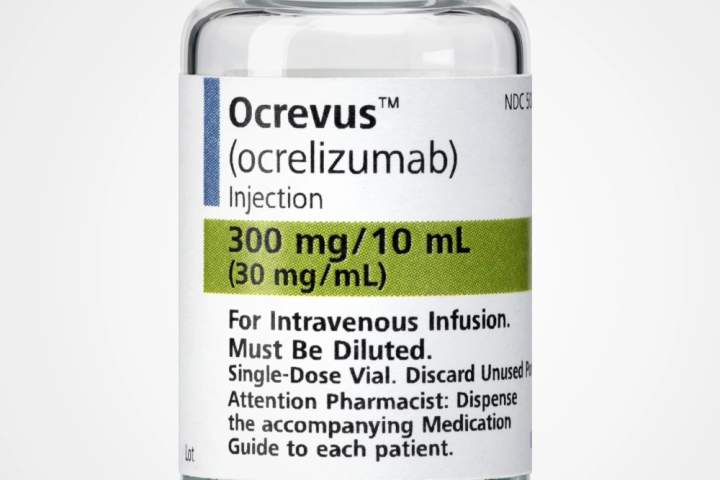Health
B.C. Woman Advocates for MS Drug Ocrevus Amid Coverage Gaps

A woman in British Columbia is raising her voice against the provincial government’s refusal to cover a critical drug for multiple sclerosis (MS) that has significantly improved her quality of life. Cassandra Nieman, 40, fears that without the medication, her daily experiences will deteriorate substantially. Currently, she relies on the drug Ocrevus, which has not only enhanced her vision but also alleviated other debilitating symptoms associated with MS.
Nieman first began to experience vision loss nearly a decade ago, leading to her eventual diagnosis of MS. “I was a working mom,” she explained. “We were out all the time. We were doing things all the time.” However, her condition forced her to stay home constantly. “If I was going out, even now, it’s short trips. I try to plan, because I know my eyes can’t handle the movement. They can’t handle the brightness… even going to the movies with my kids, I can’t do that anymore.”
Her situation became more complicated when her husband’s insurance coverage for Ocrevus is set to change, pushing her to consider the possibility of paying approximately $20,000 per year out of pocket. Nieman expressed her deep concern, stating she is “terrified” of being without the medication that has dramatically transformed her life. “I didn’t have to go for the heavy-duty IVs anymore,” she shared. “By 2022, I didn’t need steroids anymore. I haven’t needed them since. And my MRIs have remained stable.”
Despite the drug’s effectiveness, the provincial government does not cover Ocrevus. Instead, it provides coverage for a generic version of the drug, which comes with more severe side effects. Dr. Mark Freedman, a neurologist at the Ottawa Hospital Research Institute, emphasized that the choice to promote a cheaper alternative, Rituximab, focuses solely on cost. “The only reason to go to biosimilars is the cost,” he noted. “Someone’s not thinking outside the envelope. They’re looking at the simple cost of the drug.”
Demand for clarification regarding B.C.’s unique stance on Ocrevus has been made to the Ministry of Health, but a response has not been received. Nieman received her last dose of Ocrevus last week, and she reflected on the impact it has had on her family life. “When we look at how well it has done things for me and my family, where I can actually go and do things now, I’m not always in pain,” she said. “I’ve been able to at least go and do things with my family now and go camping. We can go and do things and not have to be worried that I have to be close to somewhere where I’m going to be able to get help if I need it.”
As Cassandra Nieman continues to advocate for better access to Ocrevus in British Columbia, her story highlights the urgent need for policy change regarding drug coverage for those living with chronic illnesses. With the potential financial burden looming, she hopes to raise awareness and prompt action from provincial authorities to ensure that vital treatments remain accessible for everyone.
-

 Science3 months ago
Science3 months agoToyoake City Proposes Daily Two-Hour Smartphone Use Limit
-

 Top Stories3 months ago
Top Stories3 months agoPedestrian Fatally Injured in Esquimalt Collision on August 14
-

 Health3 months ago
Health3 months agoB.C. Review Reveals Urgent Need for Rare-Disease Drug Reforms
-

 Technology3 months ago
Technology3 months agoDark Adventure Game “Bye Sweet Carole” Set for October Release
-

 World3 months ago
World3 months agoJimmy Lai’s Defense Challenges Charges Under National Security Law
-

 Lifestyle3 months ago
Lifestyle3 months agoVictoria’s Pop-Up Shop Shines Light on B.C.’s Wolf Cull
-

 Technology3 months ago
Technology3 months agoKonami Revives Iconic Metal Gear Solid Delta Ahead of Release
-

 Technology3 months ago
Technology3 months agoApple Expands Self-Service Repair Program to Canada
-

 Technology3 months ago
Technology3 months agoSnapmaker U1 Color 3D Printer Redefines Speed and Sustainability
-

 Technology3 months ago
Technology3 months agoAION Folding Knife: Redefining EDC Design with Premium Materials
-

 Business3 months ago
Business3 months agoGordon Murray Automotive Unveils S1 LM and Le Mans GTR at Monterey
-

 Technology3 months ago
Technology3 months agoSolve Today’s Wordle Challenge: Hints and Answer for August 19









